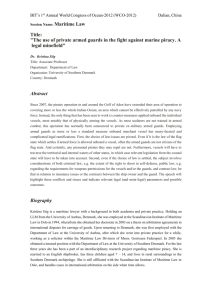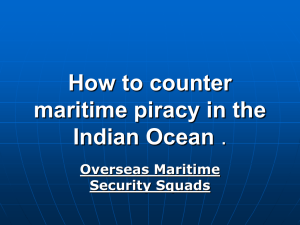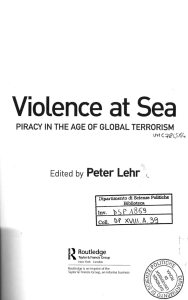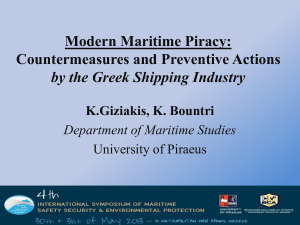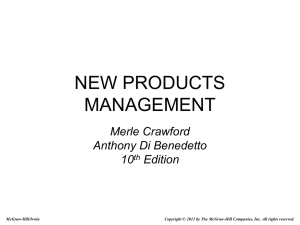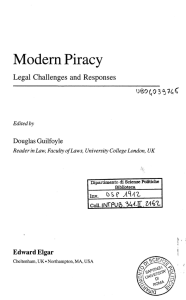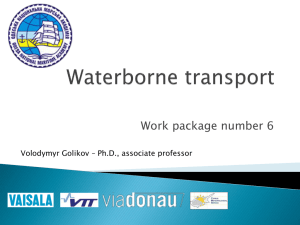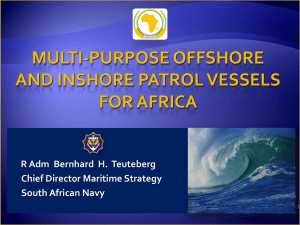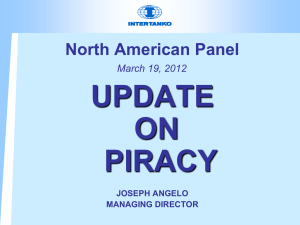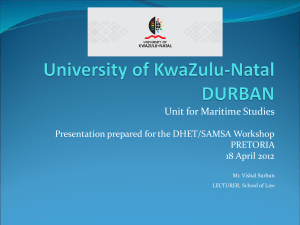The Effect of Maritime Piracy on Greek Shipping
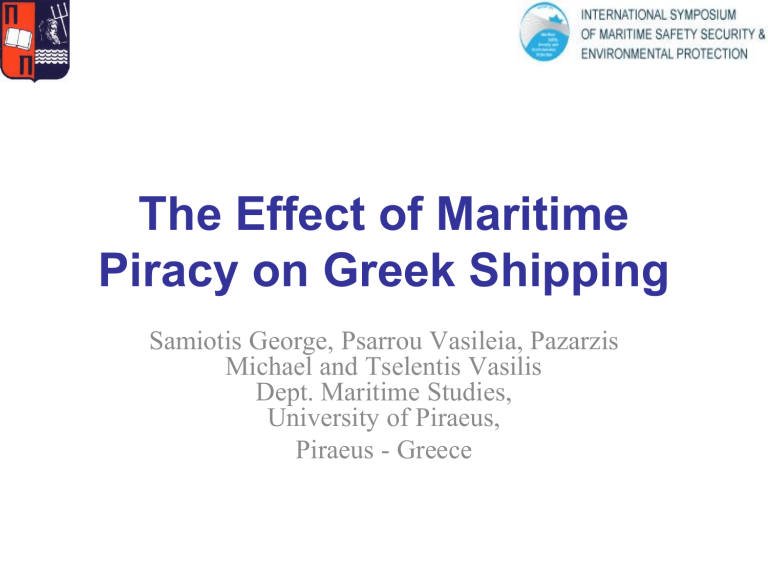
The Effect of Maritime
Piracy on Greek Shipping
Samiotis George, Psarrou Vasileia, Pazarzis
Michael and Tselentis Vasilis
Dept. Maritime Studies,
University of Piraeus,
Piraeus - Greece
Methodology
• Questionnaires to Greek maritime companies.
• Sent 100, received 35 and our research is on going.
• Personal interviews.
• Management of pirate incidents, complying with BMP4 and use of armed guards, Humanitarian response.
Our aim…
Analyze the phenomenon of piracy and the cost imposed on maritime companies.
Social awareness.
Compile measures for tackling piracy and evaluate effectiveness.
Managing Countries whose ships were attacked (2012)
50
40
30
20
10
0
80
70
60
Malaysia Hong Kong India Japan Greece Germany Singapore
Maritime Piracy
• The most modern and organized form of highly a growing & profitable criminal
"business" activity.
• Pirate attacks occur around the world :
Seas surrounding Somalia, Indonesia, the
Philippines, the West Coasts of Africa and
Southwest America.
• The Gulf of Guinea accounted for 427 of the
1434 attacks in African waters between
2003 and 2011.
Total attacks worldwide (May 2013)
Somalia
Decline of Somali attacks 2012 – 2013.
In 2011, pirates earned $146m ($111 in 2010), an average of $4.87m per ship, from ransom paid by shipping firms.
However, IMB states that policing 500 and interventions by international navies are
400
300 deterring pirates, along with ships employing Best 200
Management Practices (IMO),
100 including the use of armed
0 guards and other onboard security measures.
2006 2008 2010 2012
Global attacks without
Somalis
Somali attacks
Ransoms paid out to Somali pirates
The effect of maritime piracy on the shipping industry
15%
Yes No
85%
Ship type as a target for a pirate attacks (2012)
70
60
50
40
30
20
10
0
Bulk
Carrier
Chemical
Tanker
Container Tanker Product tanker
Tug General
Cargo
LPG
Tanker
Offshore
Supply
Ship
54%
0%
15%
Bulk Carrier T anker Ship LNG Container Ship
31%
Other
Cost burdens Greek companies
• Insurance cost
• Re – Routing cost
• Cost of Deterrent security equipment
• Wages of security guards
45
40
35
30
The costs incurred by maritime piracy are expected to be high for
Greek shipping companies, since they represent 16,3% of world tonnage.
25
%
20
15
10
5
0
Insurance cost Cost of Re-Routing Cost of Deterrent
Security Equipment
Other
Cost burden to Greek companies
• Piracy increased running costs, affecting competitiveness by increasing freight rates.
• Increased insurance premiums covering the welfare of seafarers, cargo and the vessel.
21%
24%
9%
46%
Much Enough Little None
Measures
• Use of armed guards.
• Almost all the maritime companies employ guards.
• The majority of shipping firms implement Best
Management Practices
(BMP4).
• Better management crew training on adopted measures.
25
20
15
10
5
0
BMP4 Guards Other
6
5
4
3
2
1
0
Deployment of armed guards
Enhancement of crew training Adoption of BMP4
Measures for piracy avoidance
Other
Reasons for Somalia piracy
6
5
4
3
2
1
0
Political instability in Somalia Lack of political will by local political leaders.
Causes
Reduction of fish stocks National financial and economic situation
Conclusions
Greek maritime companies:
• Use of armed guards and simultaneously complying with BMP4.
• Greater cost for companies:
Insurance cost
• Costs are “considerable” (46%) and high (9%).
45% answered that costs were little or none.
• Most firms state that deployment of armed guards and BMP4 implementation, are very effective.
Conclusions
cont’d
85% of all maritime firms state that maritime piracy has a serious effect on the shipping industry
Some differentiation is seen in the ship type as a target for a pirate attacks, compared to the world wide picture
Maritime firms agree that pirate attacks in Somalia are diminishing, however there are already 100 incidents in 2013 (
Somalia 6 (1 hijack) BUT in Nigeria 19 incidents
)
Pirates – collaborators and international interests are restructuring, investing in new technology and will strike again, in other parts of the world, not necessarily only in Somalia.
